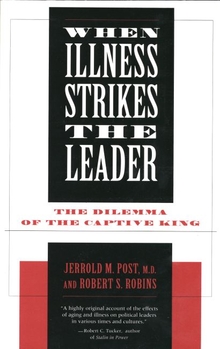When Illness Strikes the Leader
WARNING
You are viewing an older version of the Yalebooks website. Please visit out new website with more updated information and a better user experience: https://www.yalebooks.com
The Dilemma of the Captive King
Robert S. Robins and Jerrold Post
Post and Robins investigate the effects of illness on the leader, his inner circle, his followers, and the political system itself. They discuss such thought-provoking topics as:
—how the nature of the illness affects decisionmaking;
—how mortal illness can make a leader more determined to make his mark on history;
—how a leader's disability can be hidden from the public in every political system;
—the effects of prescribed drugs and substance abuse on leadership behavior;
—the conflicted role and ethical dilemmas of physicians who care for the powerful;
—and how the demands and privileges of high office compromise the quality of medical care.
In closed societies where there is no clear mechanism of succession, say the authors, the ailing or aging leader and his close advisers can become locked in a fatal embrace, each dependent upon the other for survival: a captive king and his captive court. In the absence of clear rules for determining when a leader is disabled and should be replaced and how a successor will be chosen, illness in high office can be highly destabilizing. Post and Robins's book will be engrossing—and timely—reading for all those interested in leadership, history, and the political process.
"A superbly written book. Post and Robins provide the reader with carefully researched, historical examples which illustrate the political, social, and diplomatic consequences that can result from illnesses of those at the seat of power. They also illuminate the special professional and ethical responsibilities of physicians who care for world leaders. The authors are to be congratulated for this unique contribution to the understanding of world events."—Lawrence C. Mohr, M.D., White House Physician
"Post and Robins's incisive analysis of illness and leadership is nothing short of a tour de force."—Bert Park, M.D., author of The Impact of Illness on World Leaders
"This study is a major contribution in a field of enormous importance in practical political life: How does life go on for the body politic when its leaders are incapacitated? Post and Robins provide incisive analysis and useful recommendations for both doctors and policymakers."—Lee H. Hamilton, chairman, Subcommittee on Foreign Affairs, U.S. House of Representatives
"This book is a breakthrough in the study of political leadership. Post and Robins combine medical, political, and psychological analysis in a highly original account of the effects of aging and illness on political leaders in various times and cultures. It should be read by scholars and citizens alike, not least by those in power."—Robert J. Tucker, author of Politics as Leadership and Stalin in Power, 1928-41
"A sophisticated and knowledgeable treatment of a most complex and demanding subject. A book of top importance during an era when so many global and national leaders are subject to heavy stress and illness."—James MacGregor Burns, author of Leadership and the Pulitzer Prize-winning book, Roosevelt: Soldier of Freedom
"Jerrold Post has made it plain to those of us in government that the health and stability of heads of other nations may have as much to do with our national security as weapons and armies. Now he and Robert Robins bring that notion to a wider audience in a readable and important book."—Les Aspin, Secretary of Defense
"This readable and important book emphasizes that the health and stability of heads of other nations may have as much to do with our national security as weapons and armies."—Les Aspin
"Post and Robins have produced a both fascinating and absorbing book, mercifully lacking the pomposity so often associated with informative works. It offers coherent descriptions of complicated psychological and other disorders, and is refreshingly free from technical gobbledegook. Above all, it is very readable and will appeal to a wide cross section of readers, from the serious historical researcher to the casual browser."—Clive Chamberlain
"A highly useful account of what is special about illness and incapacity in political leaders. . . . When Illness Strikes the Leader is a substantial contribution on a complex and fascinating subject. The authors, combining medicine and political science, have the right combination of talents."—Edward J. Burger, Jr., M.D., SC.D., Institute for Health Policy Analysis
"Post and Robins present numerous fascinating examples of how such diverse leaders as Winston Churchill, the Shah of Iran, Menachem Begin, the recent Soviet gerontocracy, Mao and Deng, and several American presidents have had their ability to lead diminished to the point that they became dangers to their nations. . . . Highly recommended for . . . its readability, its emphasis on nonAmerican leaders, and its analysis of health issues specifically applied to leadership settings."—Library Journal
"The book is well written and the descriptions of medical conditions are both accurate and easily accessible to the layman."—Dr. Anthony Daniels, The Sunday Telegraph
"The book [contains] . . . fascinating anecdotes of the clash between power and medicine."—Simon Wessely, The Times (London)
"An unflinching, powerful book . . . totally satisfying."—Robert M. Dorn, Psychiatric Times
"The authors make a convincing argument that illness has a lot more to do with past and current events than historians and commentators admit."—Charles Mitchell, Detroit News/Free Press
"This book succeeds in being more than a collection of engrossing anecdotes by means of a careful attempt to put the various illnesses and the responses they stimulated into their full political context. . . . A first-class, thought-provoking book which will now be the standard work on a much-neglected subject."—Lawrence Freedman, Times Higher Education Supplement
"An unflinching, powerful book. . . . [Post and Robins] address the difficult topics in a manner that will satisfy the sophisticated reader. . . . The layperson wanting an introduction to the field will be equally comfortable."—Robert M. Dorn, m.d., Psychiatric Times
"A persuasive case for giving more attention to what to do when world leaders suffer serious ailments."—The Economist
"The overwhelming significance of this work is that it makes brilliantly clear the dangers this nation confronts from presidential disability and the failures of the political system to deal with the likelihood of such dangers."—Marvin Zonis, Psychohistory Review
"A highly useful account of what is special about illness and incapacity in political leaders. . . . A substantial contribution on a complex and fascinating subject."—Edward J. Burger, Jr., M.D., Sc.D., New England Journal of Medicine
"Everyone in the medical profession will enjoy reading this book, and the suspicions of the lay public and the press will be greatly enhanced by the shenanigans that are described."—Burton Lee, M.D., (former White House physician), Oncology Times
Publication Date: February 22, 1995








